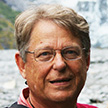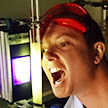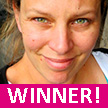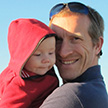
Peter Perry
Favourite Thing: Anything related to computers – or almost any other area of science. Basically I am a science junkie.
My CV
School:
Starting about 1952 – 3 primary schools – Echunga, Norton Summit, Rose Park, Then Norwoord High SChool
University:
STarting about 1962, Adelaide University – Science degree majoring in maths, the honours computer science and a master’s degree in computer science.
Work History:
Salisbury CAE, EMI Electronics, DSTO and a number of shorter contracts.
Employer:
Defence Science and Technology Organisation
Current Job:
Design computer software, solve problems
Me and my work
Computer Software Architect
Design how computer programs can work together to solve problems (currently, problems in image processing). This often comes down to “what sort of language would make this problem easy to solve?”
The task of the architect is to break a large problem up into a lot of simpler problems that area easier to solve, much like a building architect breaks up the complex problem of making a building into work for cement workers, bricklayers, plumbers, plasterers, etc.
My current work is a large set (over 600) of programs for processing images – finding bright spots, filtering, converting into different formats, working out how two different images relate to each other – which have to work together to achieve an end task – perhaps finding ships in an image taken from a sattelite. And the images are often huge – say 900 million pixels (a small camera might be 5 million, a good camera 15 million, so these are really big). One of the problems is how to process such large pictures quickly. The computers we work with may have 128 “cores” – like 128 separate computers in the same box; in contrast, my home computer has 2 cores (it is rather old) and my new desktop computer at work has 12. We process the image in “tiles” – think like on your bathroom wall – assigning each tile to a core. But writing programs to do parallel processing (a technical name for this, sometimes called “multi-threading”) is very difficult and easy to get wrong. Our system solves this by running them as separate programs, with messages telling each one which parts of the image it should process; the operating system (we use Linux) is very good at this and knows how to get it right, all our programs must get right is the dividing up of the image. The tiles we use overlap a little bit so we do not miss anything in the joins.
My Typical Day
Often very varied; mostly sitting at a computer or taking to colleagues.
It might just be sitting in front of my computer most of the day designing (and writing) software.
It usually would involve talking to colleagues, both here and overseas (by email, video conference, sometimes by traveling) about issues they are having.
Often it involves just sitting and thinking (or walking around and thinking) about the best way to solve a particular problem, or about a better way to do something.
As well as looking for better ways to do the task, I am also the person that gets handled the urgent or “too hard” problems by other members of the team.
What I'd do with the money
Use it to support school science
I am involves in the CSIRO Scientists and Mathematicians in Schools program, and the schools I am involved with could use the money for equipment for their science rooms or support for their science clubs.
My Interview
How would you describe yourself in 3 words?
old, enthusiastic, experienced
Who is your favourite singer or band?
I used to love the music of an English rock band called The Shadows
What is the most fun thing you've done?
Finding the submarine (at 3 am in the morning) on the sonar screen of a destroyer
If you had 3 wishes for yourself what would they be? - be honest!
I pretty much have everything I want – perhaps some more energy.
What did you want to be after you left school?
When I was young, a train driver. By the end of high school, a mathematician
Were you ever in trouble in at school?
Some times.
What's the best thing you've done as a scientist?
The sonar project was rather cool, but I really love my current project.
Tell us a joke.
There are 10 kinds of people in the world – those who understand binary numbers, and those who don’t.
Sports followed
Used to play Judo and basketball. Was a basketball umpire for some years
Favourite team
Go the Crows – although I am not a great football fan.
My profile link:
https://nitrogena13.imascientist.org.au/profile/peterperry/
 Print this profile
Print this profile








 Print this profile
Print this profile